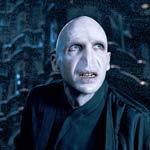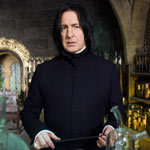By Orson Scott Card
(I’m assuming that anyone reading this essay has already finished “Harry Potter and the Deathly Hallows.” If you haven’t, stop reading now, and get back to J.K. Rowling so you’ll know what I’m talking about, and I won’t spoil the story for you.)
Until this seventh book, the answer to “Is Harry Potter a Christ figure” has been “no.”
And even now, despite the obvious similarity, I still say a qualified no.

Yes, Harry does voluntarily go to his death in order to save, not the lives of his fellow war fighters (for no one believes that Voldemort will actually keep his word), but rather the future of the human race, from domination by irresistible evil. And he does so knowing that his “father”—Dumbledore—wishes him to do it.
Yes, after being slain by the evil enemy, he spends a short time in a sort of nonce world and then returns to life. In a sense he has already beaten Voldemort, but there is yet a final battle between them, in which Potter is triumphant and the world is saved. Not only that, but he continues to bear, not the stigmata, but still a stigma—the lightning scar.
But these similarities are relatively very slight, and such hero-sacrifice myths are common to many cultures.
Let’s take just a moment to note the huge dissimilarities:
Harry returns, not as a resurrected immortal, but as a mortal being who will marry and have children and live to raise them.
Harry is not a figure of divine power or wisdom. He is far from being the best wizard alive, nor is he the cleverest. Nor is he even the bravest, or the purest. In no sense does he approach divinity.
Harry was conceived in the ordinary way, and his mother, while lovely, was not of immaculate conception. (Please don’t start theorizing to me about “Muggle-born” bearing some resemblance.)
Harry’s “resurrection” didn’t resurrect a single other soul. In fact, he specifically rejects the opportunity theoretically offered by the Deathly Hallows to gain power over death. Since gaining power over death was an essential part of what Christ was doing, this is a glaring dissimilarity.
Harry’s sacrifice gave him no power of redemption. Sinners will still bear the consequences of their sins and Harry will have nothing to do with saving their souls. The only soul that Harry saved is his own.
But…the similarities exist, and the differences exist.
Some will say that what matters is what Rowling intended. Did she mean us to think of Harry as a Christ figure.
But I say, so what if she did? Or didn’t?
When you say that a literary character resembles Christ or fulfills a christic function in a story, what does that actually mean? How is the story’s effect on the reader changed by such a thing—except insofar as the reader notices the christicity of the character and is distracted from the story by wondering if the writer is committing the sin of allegory?
Whatever Rowling intended, here is what she did: She made Harry so real, so detailed, so believable, so completely himself, that if we are reading properly, we do not experience the last book analytically, we experience it emotionally. What matters to us is not that someone resembling Christ is going through these adventures, but rather that Harry Potter is.
The moral, as the aesthetic, quality of a work of literature is not seriously influenced by what other works of art or real-world events or artifacts the story might call to mind.
How Fiction Works, Morally
If a storyteller is doing a good job, readers immerse themselves in the tale. Readers allow the storyteller to fill their minds with memories. If the storyteller can lead the readers to care about and believe in the tale, and if the tale is clearly told, then those memories will be vivid.
The readers will remember having lived through the events that the author depicted. Those memories become part of the deep store of mindlore that shapes the readers’ perception of the real world. While the readers—the sane ones, anyway—will, at a conscious level, never forget which events were imaginary and which were real, at an unconscious level the brain makes scant distinction.
That is, when you remember a story that you read, you don’t remember gripping the pages of the book, decoding the marks on the paper. You remember the images that came to mind, the choices the characters faced, the decisions they made, the price they paid, the rewards or punishments they gained. You remember the sequence of events.
Any part of the reading process you do remember (standing in line to buy the book, having your father read it to you in a moving car, talking about it with your friends) remains a separate memory, associated with the story but not part of it.
The key differences between fictional memories and real ones is that you understand, in the fictional story, why things happen. Not only that, but whatever the author ends up saying about causality remains true forever—within the story.
In the real world, we never understand why people do the things they do, or why the world works the way it does. People offer “helpful” ideas—“It must be part of God’s plan!” “It’s in our genes, there’s no escaping it.” “Life sucks my friend, and that’s all.” “It’s karma; what goes around, comes around”—but we know that they don’t know what they’re talking about.
They aren’t even trustworthy when telling about their own motives. We aren’t even trustworthy when we tell ourselves about why we did the things we’ve done.
Haven’t we all had the experience of doing something for perfectly clear reasons, and then—days or months or years later—realizing that the real reason we did it was completely different?
But in fiction that never happens. When Huckleberry Finn does not turn in Jim as a runaway slave, it would be absurd for some critic to write that his real reason for this was because he hoped to get a better price by selling Jim downriver in New Orleans.
Such a critic could offer no proof—no newspaper clippings, no eyewitness accounts, no newly-discovered documents—because Huckleberry Finn does not exist.
The very fictionality of fiction means that whatever the author says about causality within the story is final. The author is the only authority.
That doesn’t mean that by reading a book you will come to believe absurd things, just because the author says so.
Obviously, sane adults don’t come out of Harry Potter believing that there are really wizards and witches secretly confunding or imperiusing us and getting us to do their bidding. But then, the author does not intend us to believe that. Rowling keeps the boundary line between the real world and the fantasy world clearly drawn. We have entered one of the many lands of Faerie; it is an imaginary place.
But within that place, she has created clear rules. Magic functions according to set principles.
In the real world, the distinction between wands of different manufacture is meaningless. If you wish to make a wand like Harry’s, then your problem is finding a phoenix feather, not dealing with the magical hijinks that will ensue once you have found it.

But in the fantasy world, it matters whose wand it is, what it’s made of, and who your opponent is. And when Rowling says that the Deathstick or Elder Wand only confers its powers on its rightful owner, and the rightful owner is not the one who kills the previous owner, but the one who disarmed the previous owner, no matter which wand he took away — well, it’s not as if we can argue with her. She has the final word on that.
Yet she also has no intention of persuading us that this is how the Elder Wand really works because wands don’t really work.
The place where the causal chains of fiction apply in the real world is specifically in the realms of human motive and moral analysis—and these areas are inseparable.
Motive Is Everything
Every child knows this, as does every parent. When daddy catches you with your fingers under the lawnmower or pointing a gun at your brother, he will, at some point, look at you with consternation and say, “What did you think you were doing?” To which the child will say, “I don’t know.”
The real question is: Why were you doing something that you knew to be stupid and dangerous? And the answer is: I was tempted to do something perilous; I ignored the consequences because the attraction was greater than my resistance to it.
Five-year-olds don’t talk that way—nor do fifteen-year-olds (and they’d probably get grounded if they did). But that’s the moral situation that’s going on.
There’s a judge, holding someone accountable for their choices, good or bad. But in making just judgment, motive always plays a role.
When daddy says, “What did you think you were doing?” if the child says, “I made sure the gun was unloaded, just like you taught me, Daddy. But Jimmy had stuck his finger in the barrel and his finger’s so tiny it got stuck. I had just barely managed to get it unstuck when you came in, and the gun was still pointing at him.”
If that story is consonant with what the just judge (daddy) witnessed, then chances are very good that junior will get off. In other words, what seemed a sin ceases to be a sin when the motive is right.
(And if someone is going to accuse me of situational morality, I will simply reply that there is no other kind. Cain would have been fine killing Abel if he had done so to keep Abel from killing Seth. Only the fact that Abel was innocent of wrongdoing and posed no threat to Cain or anyone else makes the killing a cold-blooded murder.)
In the real world, there is no just judge. We’ve certainly had enough examples in recent years of innocent people being convicted of crimes and sentenced to death. And which of us has not judged a friend or family member harshly, only to discover later that we simply did not have enough information, so that what seemed a just judgment was unjust after all?
That goes both ways, of course. We will often judge someone to be honest and bestow our trust, only to discover, when more information comes, that he was a liar from the start.
In fiction, characters can (and do) go through the same process. Harry idolizes his father. Then he discovers that his father was a bully, every bit as cruel to Snape and others he deems his inferiors as Snape has ever been to Harry Potter himself.

As for Snape, Harry has hated him, and in book 6 it seems clear to Harry that Snape has proven that Harry was right about him all along, when Snape seemingly kills Dumbledore in cold blood. There are hints (which some of us wrote about at great length—see my essay “Who Is Snape?” at www.hatrack.com) that Harry is wrong about Snape—but he’s wrong because he has insufficient information, and no motive to try to get more. It is, to him, a settled question.
So Harry is an unjust judge, and some readers might have been as well. But the novel is not over; the writer is not finished.
We are given more information, very near the end of the final book. At last Harry gets full access to all the relevant parts of Snape’s story, and realizes the reason why Snape has hated him and yet been unable to leave him alone. He even understands why Snape wanted to die while looking directly into Harry’s eyes.
All is transformed. Harry not only understands why Snape killed Dumbledore, but also why Snape was unable to judge Harry fairly and misinterpreted everything that Harry did, assuming motives for him that were not there. For Snape was doing just what Harry, in his ignorance, wished—he was linking the son to the father, and thus the sins of the father were visited upon the son.
Only when the story is complete and all that we are ever going to know is known can we ascertain the moral flow of the story.
And, except where the author has explicitly raised the issue (as with Snape’s motive for killing Dumbledore), we are rarely aware of what the moral statements of the fiction are.
The author will show certain characters as admirable because of certain actions taken for certain motives. We will either agree or disagree—but not consciously! If we are comfortable with the moral universe of the story—which things are admirable, which despicable—then we will scarcely notice it. But if it makes us uncomfortable, we rarely understand that our response is a moral one.
Most people think “morality” in fiction means whether people do bad things. But morality in fiction means why people do bad things, and whether we are expected to admire or despise them for it. When an author makes us live in a moral universe that is too different from our own to bear it, we may say, “I don’t believe the story,” or “I just lost interest and never finished it,” but rarely will we realize that our rejection is actually on moral grounds.
Nor, when the story takes us outside our previous moral framework and we like it, will we recognize that we are being morally transformed—that our moral worldview is different now, because this story is a part of our memory.
There is, of course, a third response, neither accepting nor rejecting the moral contradiction: We simply edit our memories so the story does conform with our previous moral worldview. I have had readers of my work swear up and down that a character did something which, in fact, I never had the character do. They will remember events that are not in my book, or forget events without which the rest of the story makes no moral sense at all.
Because reading is not passive; it is not a one-way transaction. Our stories are laid into minds that have a preexisting moral framework. Our readers are quick to embrace stories that reinforce what they already believe about human behavior, and when the story is different from what they believed, they are more likely to reject the story or edit their memory of it than to change, at a deep level, what they believe is wrong or right.
But still…they change often enough, especially in response to stories of great emotional power, that some literature goes a long way toward shaping a culture, rather than merely reflecting it.
With all of this as groundwork, then, we come to this: The moral effect of the Harry Potter series has little to do with Harry as a king-sacrifice or Christ figure or whatever other category you want to push him into, and everything to do with which acts are evil and which good, which motives are worthy and which not, and above all, how it is that good overcomes evil, and what the good life turns out to be.
So before I tell you my answers—what I think is going on in Harry Potter (or rather, a small part of what I’ve noticed is going on)—think about it yourself. What is it that makes good good, and evil evil? How do you end up ranking the evil of Lucius Malfoy, or Narcissa Malfoy, or Draco? How good is Harry? Dumbledore? Snape? What motives excuse bad actions; how much do good action redeem bad ones? (Wormtail’s momentary hesitation in the Malfoys’ dungeon, for instance—hardly enough virtue to save him, but enough to save Harry!)
Think about it, and check back with me in a day or so.
Meanwhile, I’ll also look at Patrick’s response to the book and, if he dares to disagree with me on any point, I’ll sic the Dementors on him and suck out his soul. That’s just the kind of guy I am.
